Child Development Essay: Poverty's Impact on Physical & Mental Health
VerifiedAdded on 2022/10/12
|6
|1485
|370
Essay
AI Summary
This essay examines the significant impact of poverty on child development, focusing on both physical and mental health outcomes. It highlights the problems associated with child poverty, such as inadequate nutrition, lack of education, and exposure to poor living conditions, and their detrimental effects on children's well-being. The essay then explores potential solutions, emphasizing the role of government intervention through initiatives like free education, meal programs, and job creation for parents. It also discusses the importance of providing healthcare facilities in impoverished areas and addressing job loss to mitigate child poverty. The conclusion reiterates the importance of these measures in ensuring children's rights to education, food, and safety, ultimately contributing to a brighter future for both the children and the nation. The essay is supported by several academic references to support its claims.
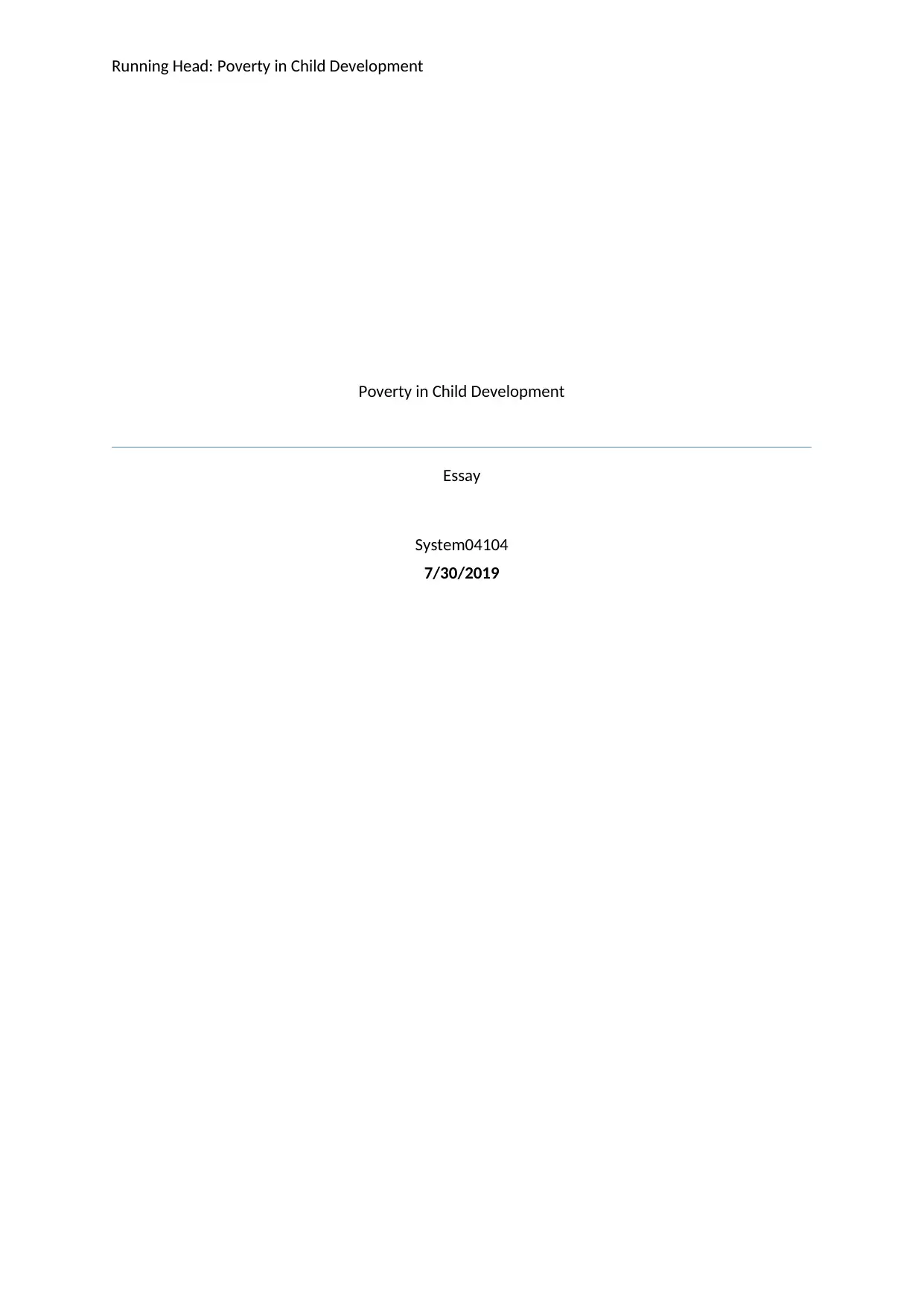
Running Head: Poverty in Child Development
Poverty in Child Development
Essay
System04104
7/30/2019
Poverty in Child Development
Essay
System04104
7/30/2019
Paraphrase This Document
Need a fresh take? Get an instant paraphrase of this document with our AI Paraphraser
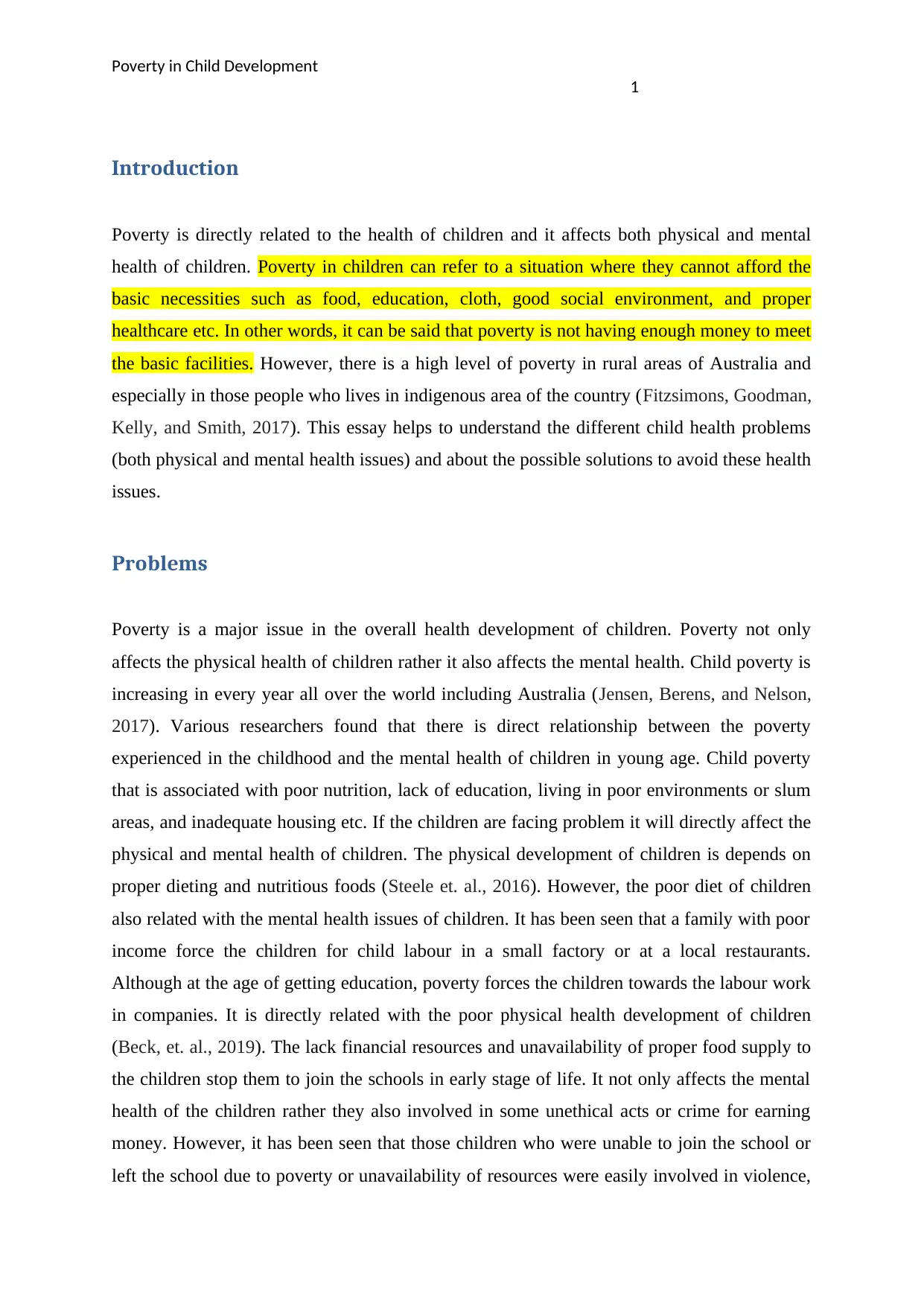
Poverty in Child Development
1
Introduction
Poverty is directly related to the health of children and it affects both physical and mental
health of children. Poverty in children can refer to a situation where they cannot afford the
basic necessities such as food, education, cloth, good social environment, and proper
healthcare etc. In other words, it can be said that poverty is not having enough money to meet
the basic facilities. However, there is a high level of poverty in rural areas of Australia and
especially in those people who lives in indigenous area of the country (Fitzsimons, Goodman,
Kelly, and Smith, 2017). This essay helps to understand the different child health problems
(both physical and mental health issues) and about the possible solutions to avoid these health
issues.
Problems
Poverty is a major issue in the overall health development of children. Poverty not only
affects the physical health of children rather it also affects the mental health. Child poverty is
increasing in every year all over the world including Australia (Jensen, Berens, and Nelson,
2017). Various researchers found that there is direct relationship between the poverty
experienced in the childhood and the mental health of children in young age. Child poverty
that is associated with poor nutrition, lack of education, living in poor environments or slum
areas, and inadequate housing etc. If the children are facing problem it will directly affect the
physical and mental health of children. The physical development of children is depends on
proper dieting and nutritious foods (Steele et. al., 2016). However, the poor diet of children
also related with the mental health issues of children. It has been seen that a family with poor
income force the children for child labour in a small factory or at a local restaurants.
Although at the age of getting education, poverty forces the children towards the labour work
in companies. It is directly related with the poor physical health development of children
(Beck, et. al., 2019). The lack financial resources and unavailability of proper food supply to
the children stop them to join the schools in early stage of life. It not only affects the mental
health of the children rather they also involved in some unethical acts or crime for earning
money. However, it has been seen that those children who were unable to join the school or
left the school due to poverty or unavailability of resources were easily involved in violence,
1
Introduction
Poverty is directly related to the health of children and it affects both physical and mental
health of children. Poverty in children can refer to a situation where they cannot afford the
basic necessities such as food, education, cloth, good social environment, and proper
healthcare etc. In other words, it can be said that poverty is not having enough money to meet
the basic facilities. However, there is a high level of poverty in rural areas of Australia and
especially in those people who lives in indigenous area of the country (Fitzsimons, Goodman,
Kelly, and Smith, 2017). This essay helps to understand the different child health problems
(both physical and mental health issues) and about the possible solutions to avoid these health
issues.
Problems
Poverty is a major issue in the overall health development of children. Poverty not only
affects the physical health of children rather it also affects the mental health. Child poverty is
increasing in every year all over the world including Australia (Jensen, Berens, and Nelson,
2017). Various researchers found that there is direct relationship between the poverty
experienced in the childhood and the mental health of children in young age. Child poverty
that is associated with poor nutrition, lack of education, living in poor environments or slum
areas, and inadequate housing etc. If the children are facing problem it will directly affect the
physical and mental health of children. The physical development of children is depends on
proper dieting and nutritious foods (Steele et. al., 2016). However, the poor diet of children
also related with the mental health issues of children. It has been seen that a family with poor
income force the children for child labour in a small factory or at a local restaurants.
Although at the age of getting education, poverty forces the children towards the labour work
in companies. It is directly related with the poor physical health development of children
(Beck, et. al., 2019). The lack financial resources and unavailability of proper food supply to
the children stop them to join the schools in early stage of life. It not only affects the mental
health of the children rather they also involved in some unethical acts or crime for earning
money. However, it has been seen that those children who were unable to join the school or
left the school due to poverty or unavailability of resources were easily involved in violence,
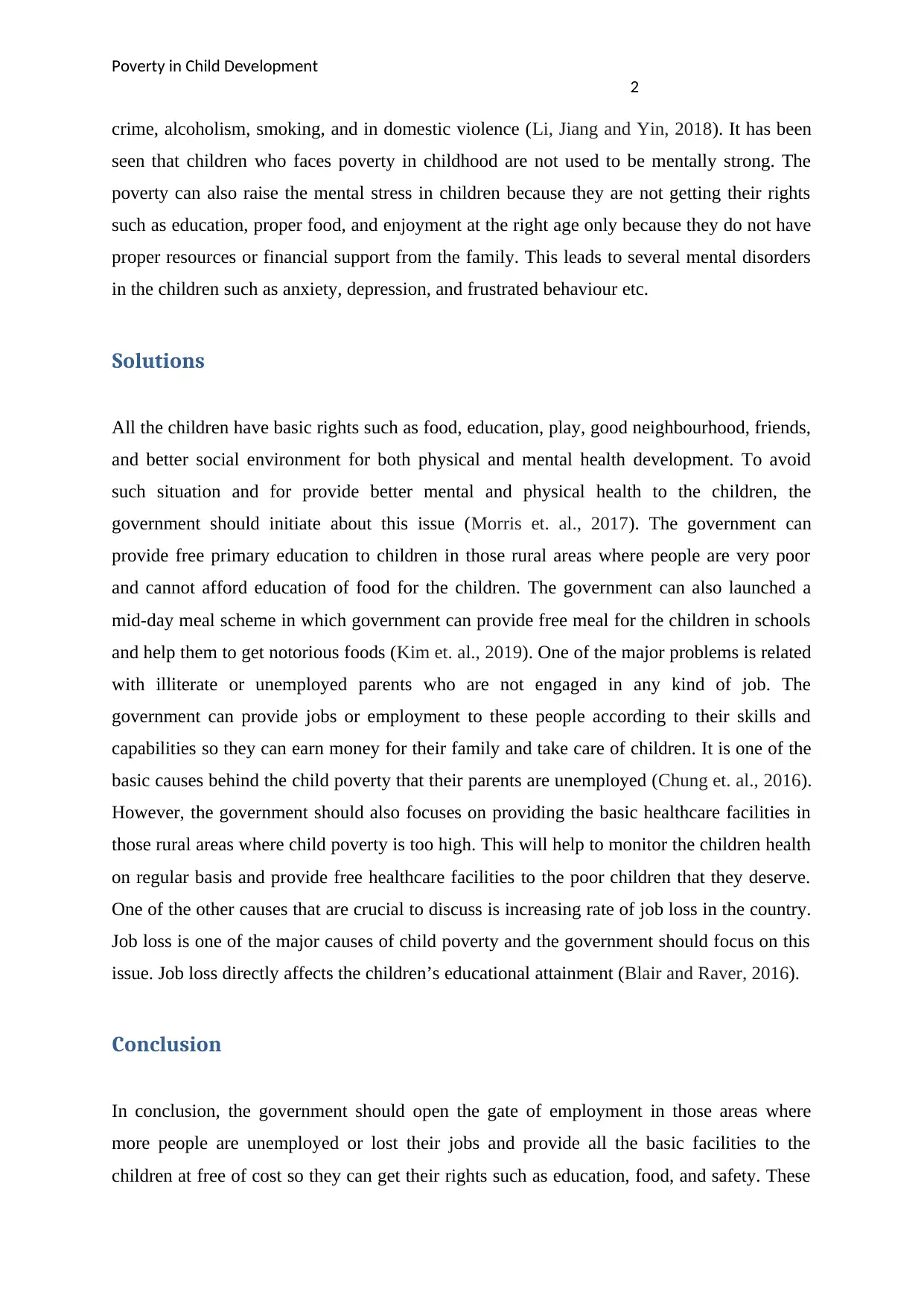
Poverty in Child Development
2
crime, alcoholism, smoking, and in domestic violence (Li, Jiang and Yin, 2018). It has been
seen that children who faces poverty in childhood are not used to be mentally strong. The
poverty can also raise the mental stress in children because they are not getting their rights
such as education, proper food, and enjoyment at the right age only because they do not have
proper resources or financial support from the family. This leads to several mental disorders
in the children such as anxiety, depression, and frustrated behaviour etc.
Solutions
All the children have basic rights such as food, education, play, good neighbourhood, friends,
and better social environment for both physical and mental health development. To avoid
such situation and for provide better mental and physical health to the children, the
government should initiate about this issue (Morris et. al., 2017). The government can
provide free primary education to children in those rural areas where people are very poor
and cannot afford education of food for the children. The government can also launched a
mid-day meal scheme in which government can provide free meal for the children in schools
and help them to get notorious foods (Kim et. al., 2019). One of the major problems is related
with illiterate or unemployed parents who are not engaged in any kind of job. The
government can provide jobs or employment to these people according to their skills and
capabilities so they can earn money for their family and take care of children. It is one of the
basic causes behind the child poverty that their parents are unemployed (Chung et. al., 2016).
However, the government should also focuses on providing the basic healthcare facilities in
those rural areas where child poverty is too high. This will help to monitor the children health
on regular basis and provide free healthcare facilities to the poor children that they deserve.
One of the other causes that are crucial to discuss is increasing rate of job loss in the country.
Job loss is one of the major causes of child poverty and the government should focus on this
issue. Job loss directly affects the children’s educational attainment (Blair and Raver, 2016).
Conclusion
In conclusion, the government should open the gate of employment in those areas where
more people are unemployed or lost their jobs and provide all the basic facilities to the
children at free of cost so they can get their rights such as education, food, and safety. These
2
crime, alcoholism, smoking, and in domestic violence (Li, Jiang and Yin, 2018). It has been
seen that children who faces poverty in childhood are not used to be mentally strong. The
poverty can also raise the mental stress in children because they are not getting their rights
such as education, proper food, and enjoyment at the right age only because they do not have
proper resources or financial support from the family. This leads to several mental disorders
in the children such as anxiety, depression, and frustrated behaviour etc.
Solutions
All the children have basic rights such as food, education, play, good neighbourhood, friends,
and better social environment for both physical and mental health development. To avoid
such situation and for provide better mental and physical health to the children, the
government should initiate about this issue (Morris et. al., 2017). The government can
provide free primary education to children in those rural areas where people are very poor
and cannot afford education of food for the children. The government can also launched a
mid-day meal scheme in which government can provide free meal for the children in schools
and help them to get notorious foods (Kim et. al., 2019). One of the major problems is related
with illiterate or unemployed parents who are not engaged in any kind of job. The
government can provide jobs or employment to these people according to their skills and
capabilities so they can earn money for their family and take care of children. It is one of the
basic causes behind the child poverty that their parents are unemployed (Chung et. al., 2016).
However, the government should also focuses on providing the basic healthcare facilities in
those rural areas where child poverty is too high. This will help to monitor the children health
on regular basis and provide free healthcare facilities to the poor children that they deserve.
One of the other causes that are crucial to discuss is increasing rate of job loss in the country.
Job loss is one of the major causes of child poverty and the government should focus on this
issue. Job loss directly affects the children’s educational attainment (Blair and Raver, 2016).
Conclusion
In conclusion, the government should open the gate of employment in those areas where
more people are unemployed or lost their jobs and provide all the basic facilities to the
children at free of cost so they can get their rights such as education, food, and safety. These
⊘ This is a preview!⊘
Do you want full access?
Subscribe today to unlock all pages.

Trusted by 1+ million students worldwide
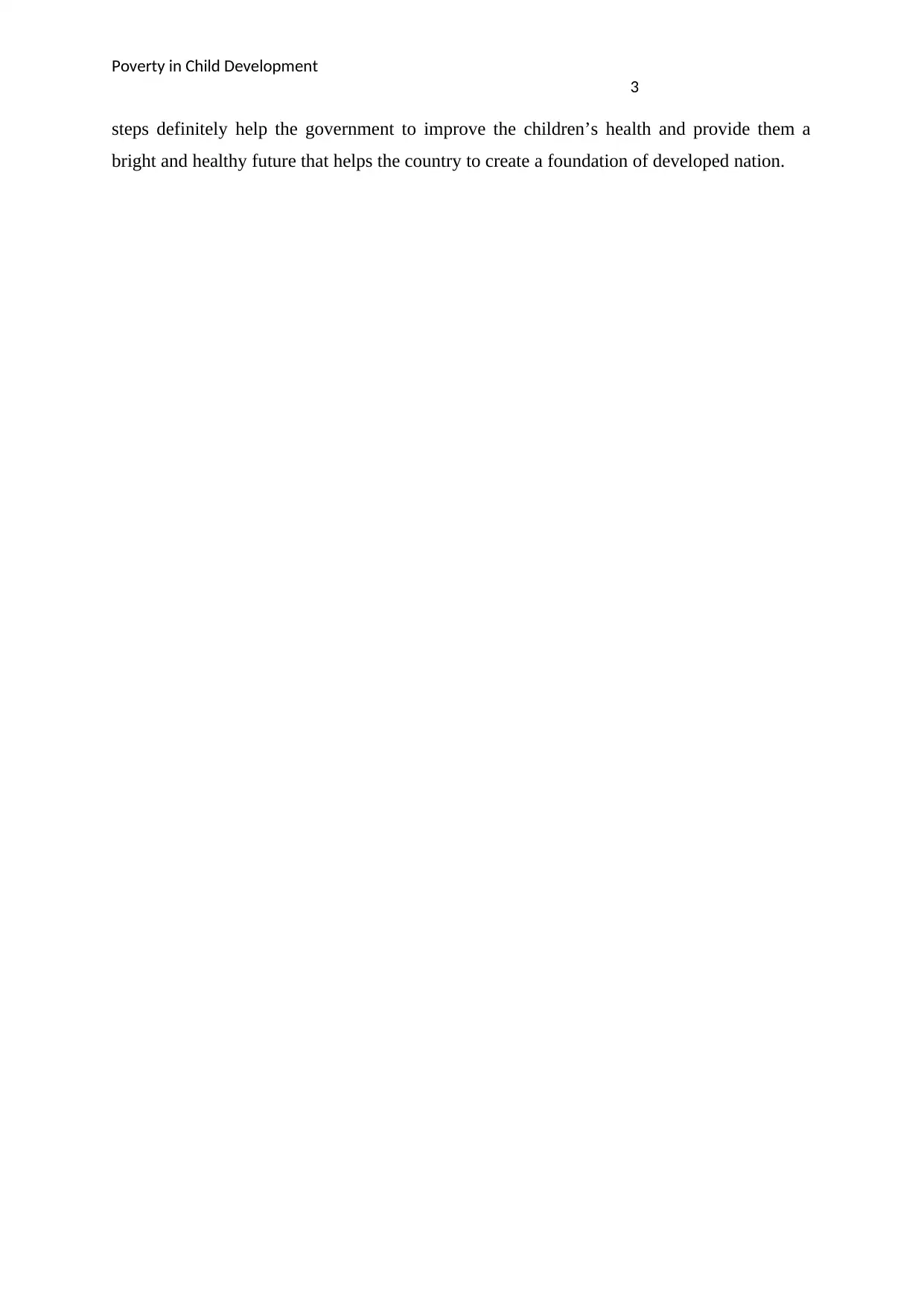
Poverty in Child Development
3
steps definitely help the government to improve the children’s health and provide them a
bright and healthy future that helps the country to create a foundation of developed nation.
3
steps definitely help the government to improve the children’s health and provide them a
bright and healthy future that helps the country to create a foundation of developed nation.
Paraphrase This Document
Need a fresh take? Get an instant paraphrase of this document with our AI Paraphraser
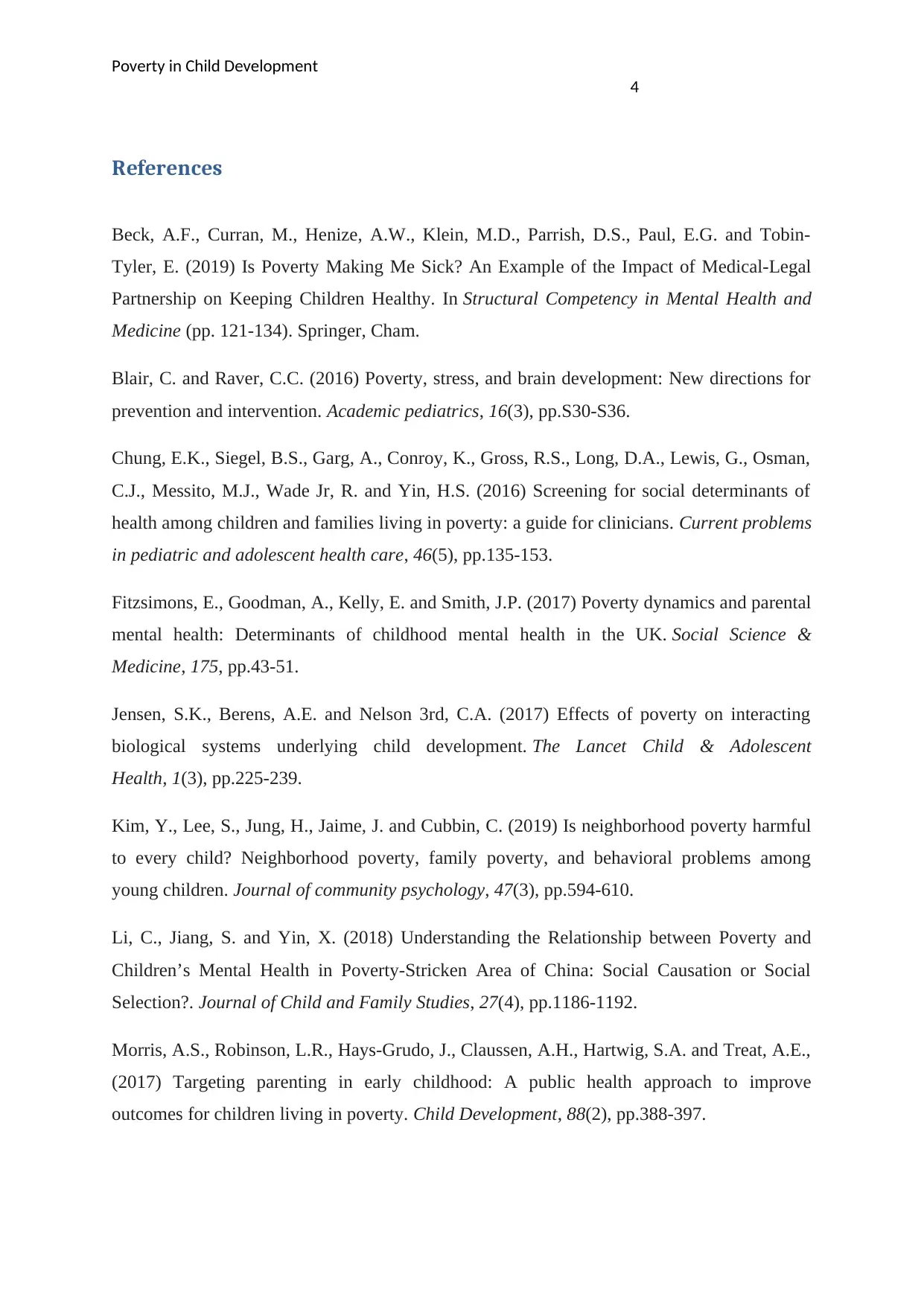
Poverty in Child Development
4
References
Beck, A.F., Curran, M., Henize, A.W., Klein, M.D., Parrish, D.S., Paul, E.G. and Tobin-
Tyler, E. (2019) Is Poverty Making Me Sick? An Example of the Impact of Medical-Legal
Partnership on Keeping Children Healthy. In Structural Competency in Mental Health and
Medicine (pp. 121-134). Springer, Cham.
Blair, C. and Raver, C.C. (2016) Poverty, stress, and brain development: New directions for
prevention and intervention. Academic pediatrics, 16(3), pp.S30-S36.
Chung, E.K., Siegel, B.S., Garg, A., Conroy, K., Gross, R.S., Long, D.A., Lewis, G., Osman,
C.J., Messito, M.J., Wade Jr, R. and Yin, H.S. (2016) Screening for social determinants of
health among children and families living in poverty: a guide for clinicians. Current problems
in pediatric and adolescent health care, 46(5), pp.135-153.
Fitzsimons, E., Goodman, A., Kelly, E. and Smith, J.P. (2017) Poverty dynamics and parental
mental health: Determinants of childhood mental health in the UK. Social Science &
Medicine, 175, pp.43-51.
Jensen, S.K., Berens, A.E. and Nelson 3rd, C.A. (2017) Effects of poverty on interacting
biological systems underlying child development. The Lancet Child & Adolescent
Health, 1(3), pp.225-239.
Kim, Y., Lee, S., Jung, H., Jaime, J. and Cubbin, C. (2019) Is neighborhood poverty harmful
to every child? Neighborhood poverty, family poverty, and behavioral problems among
young children. Journal of community psychology, 47(3), pp.594-610.
Li, C., Jiang, S. and Yin, X. (2018) Understanding the Relationship between Poverty and
Children’s Mental Health in Poverty-Stricken Area of China: Social Causation or Social
Selection?. Journal of Child and Family Studies, 27(4), pp.1186-1192.
Morris, A.S., Robinson, L.R., Hays‐Grudo, J., Claussen, A.H., Hartwig, S.A. and Treat, A.E.,
(2017) Targeting parenting in early childhood: A public health approach to improve
outcomes for children living in poverty. Child Development, 88(2), pp.388-397.
4
References
Beck, A.F., Curran, M., Henize, A.W., Klein, M.D., Parrish, D.S., Paul, E.G. and Tobin-
Tyler, E. (2019) Is Poverty Making Me Sick? An Example of the Impact of Medical-Legal
Partnership on Keeping Children Healthy. In Structural Competency in Mental Health and
Medicine (pp. 121-134). Springer, Cham.
Blair, C. and Raver, C.C. (2016) Poverty, stress, and brain development: New directions for
prevention and intervention. Academic pediatrics, 16(3), pp.S30-S36.
Chung, E.K., Siegel, B.S., Garg, A., Conroy, K., Gross, R.S., Long, D.A., Lewis, G., Osman,
C.J., Messito, M.J., Wade Jr, R. and Yin, H.S. (2016) Screening for social determinants of
health among children and families living in poverty: a guide for clinicians. Current problems
in pediatric and adolescent health care, 46(5), pp.135-153.
Fitzsimons, E., Goodman, A., Kelly, E. and Smith, J.P. (2017) Poverty dynamics and parental
mental health: Determinants of childhood mental health in the UK. Social Science &
Medicine, 175, pp.43-51.
Jensen, S.K., Berens, A.E. and Nelson 3rd, C.A. (2017) Effects of poverty on interacting
biological systems underlying child development. The Lancet Child & Adolescent
Health, 1(3), pp.225-239.
Kim, Y., Lee, S., Jung, H., Jaime, J. and Cubbin, C. (2019) Is neighborhood poverty harmful
to every child? Neighborhood poverty, family poverty, and behavioral problems among
young children. Journal of community psychology, 47(3), pp.594-610.
Li, C., Jiang, S. and Yin, X. (2018) Understanding the Relationship between Poverty and
Children’s Mental Health in Poverty-Stricken Area of China: Social Causation or Social
Selection?. Journal of Child and Family Studies, 27(4), pp.1186-1192.
Morris, A.S., Robinson, L.R., Hays‐Grudo, J., Claussen, A.H., Hartwig, S.A. and Treat, A.E.,
(2017) Targeting parenting in early childhood: A public health approach to improve
outcomes for children living in poverty. Child Development, 88(2), pp.388-397.

Poverty in Child Development
5
Steele, H., Bate, J., Steele, M., Dube, S.R., Danskin, K., Knafo, H., Nikitiades, A., Bonuck,
K., Meissner, P. and Murphy, A. (2016) Adverse childhood experiences, poverty, and
parenting stress. Canadian Journal of Behavioural Science/Revue canadienne des sciences du
comportement, 48(1), p.32.
5
Steele, H., Bate, J., Steele, M., Dube, S.R., Danskin, K., Knafo, H., Nikitiades, A., Bonuck,
K., Meissner, P. and Murphy, A. (2016) Adverse childhood experiences, poverty, and
parenting stress. Canadian Journal of Behavioural Science/Revue canadienne des sciences du
comportement, 48(1), p.32.
⊘ This is a preview!⊘
Do you want full access?
Subscribe today to unlock all pages.

Trusted by 1+ million students worldwide
1 out of 6
Related Documents
Your All-in-One AI-Powered Toolkit for Academic Success.
+13062052269
info@desklib.com
Available 24*7 on WhatsApp / Email
![[object Object]](/_next/static/media/star-bottom.7253800d.svg)
Unlock your academic potential
Copyright © 2020–2026 A2Z Services. All Rights Reserved. Developed and managed by ZUCOL.





